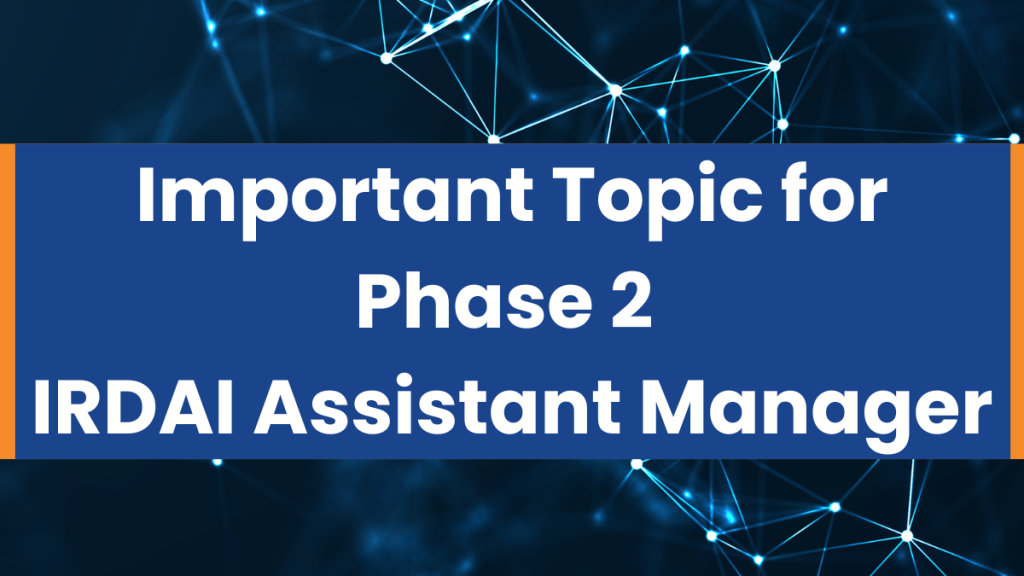The Insurance Regulatory and Development Authority of India (IRDAI) Assistant Manager Exam is a highly competitive exam that provides an exciting opportunity for candidates aspiring to work in the insurance sector. For 2024, the IRDAI Assistant Manager Phase 2 Exam will play a crucial role in selecting the best candidates for the role. To succeed in this stage of the exam, candidates need to have a well-rounded understanding of various subjects, along with strong preparation in Descriptive English, Insurance and Financial knowledge, and General Studies.
In this blog , we will delve into the important topics for the IRDAI Phase 2 Exam, focusing on the IRDAI AM Exam 2024 syllabus. We will discuss the key areas that candidates should focus on, and provide insights into each subject’s significance.

IRDAI AM Exam Notification 2024
The Insurance Regulatory and Development Authority of India (IRDAI) had earlier announced its IRDAI Assistant Manager Recruitment Notification for 2024, offering a valuable opportunity for aspiring professionals to join the prestigious insurance sector. Candidates had the chance to apply for the IRDAI Assistant Manager Exam 2024 from August 21, 2024, to September 20, 2024. The official notification provided aspirants with a detailed information on the IRDAI AM eligibility criteria, the application process, exam pattern, and the overall selection procedure.
This year, IRDAI is recruiting a total of 49 Assistant Manager vacancies across various specializations, including Actuarial, Finance, IT, Legal, and Generalist streams. Applicants need to have a very close look at the notification to ensure they meet the necessary qualifications for their chosen specialization. The selection process includes a multi-stage examination, where qualifying for the IRDAI Assistant Manager Exam 2024 is essential for advancing through the recruitment stages. Be sure to complete your application promptly to secure your place in the IRDAI Assistant Manager 2024 selection process.
IRDAI AM Exam Pattern & Syllabus
The IRDAI Assistant Manager Exam 2024 is highly competitive, making it essential for candidates to have a comprehensive understanding of the IRDAI AM exam pattern and syllabus. Knowing the IRDAI Assistant Manager exam pattern helps aspirants grasp the structure, format, and marking scheme of each phase, while reviewing the syllabus helps identify key topics to focus on. A clear understanding of both aspects ensures efficient time management and targeted preparation. Furthermore, equipping yourself with the right study resources, like essential IRDAI Assistant Manager books, can save time and enhance productivity during preparation. The IRDAI AM Exam consists of three phases and all the important details you need to know has been provided in the table below:
| Phase | Exam Type | No. of Marks | Duration |
| Phase 1 | Objective | 160 marks | 1 hour 30 minutes |
| Phase 2 | Paper 1, Paper 2 & Paper 3 (Descriptive) | 100 marks each | 60 minutes per paper |
| Phase 3 | Interview | ||
Phase 1 is an objective-type exam, focusing on core subjects, while Phase 2 includes three descriptive papers that assess in-depth knowledge. Those who qualify for Phases 1 and 2 proceed to the final Interview stage.
The IRDAI Assistant Manager Prelims (Phase 1) exam is an objective, qualifying examination. While marks obtained here determine eligibility for Phase 2, they are not considered for the interview or final selection. Phase 2 (Mains) is a descriptive examination, distinct from Phase 1, requiring a deeper understanding of the topics. The IRDAI Assistant Manager Exam Pattern 2024, detailed below, highlights this structure. With a syllabus that differs significantly between phases, it is essential to thoroughly review the Phase 2 syllabus to ensure focused preparation.
| Phase | Subject | Syllabus |
| Phase 1 | Quantitative Aptitude | Ratio and Proportion, Simplification, Percentage, Average, Time and Work, Speed, Distance and Time, Mixture and Allegations, Percentage, Permutation, and Combination, Data Interpretation, Mensuration, Probability, Set Theory, Number Series, Number Systems, Profit & Loss, Simple Interest & Compound Interest, Surds & Indices, Sequence & Series, Mensuration – Cylinder, Cone, Sphere |
| English Language | Grammar, Vocabulary, Error Spotting, Reading Comprehension, Cloze Test, Para Jumble, Fill in the Blanks, Sentence Correction, Miscellaneous | |
| General Awareness | Current Affairs, Indian Financial System, Indian Banking System, Monetary Plans, National Institution, Banking Terms, General Awareness, Static GK, History of Indian Banking Industry, Regulatory Bodies Monetary & Credit Policies, Budget Basics and Current Union Budget, International Organisation / Financial Institutions, Capital Market & Money Market, Government Schemes Abbreviations and Economic terminologies, Abbreviations and Economic terminologies | |
| Reasoning | Inequality, Coding-Decoding, Syllogism, Machine Input-Output, Data Sufficiency, Seating Arrangement, Logical Reasoning, Floor Puzzle, Scheduling, Verbal Reasoning, Ordering and Ranking, Blood Relations, Direction and Distance, Coded Inequalities, Puzzle Tabulation, Alphanumeric Series | |
| Phase 2 | English | Essay, Precise Writing, Comprehension and Business/Office Correspondence |
| Economic and Social Issues impacting Insurance | Economic Growth, business cycles and Insurance penetration, impact of age structure on economy, application of utility theory to Insurance premium setting, macroeconomic factors including catastrophes and pandemics that may impact insurers and insurance markets Financial markets, Financial Institutions and financial services integration and risks arising from interconnectedness; systemic risk and concentration risk Economic capital and risk based capital requirements, economic impact of risk transfer arrangements including reinsurance, contribution of Insurance sector to sustainable and responsible development of economy, Insurance Investments in Infrastructure sector Economic reforms in India leading to Insurance sector reforms, Insurance regulation – financial and market conduct regulations, functions of IRDAI, role of an Actuary, detariffing in India, motor business and Indian experience, changing Insurance Regulations/Laws and FSLRC. Social structure in India, Insurance in rural and social sectors and obligations of Insurers thereto, Indian Micro-Insurance experience, Social security laws and implementation thereof. RSBY – Health insurance scheme for Below Poverty Line (BPL) families. | |
| Insurance and Management | Insurance History of Indian Insurance, principles of Insurance Risk and uncertainty, pooling and diversification of risk, Indemnity and Insurable interest Legal foundations of Insurance, basics in Group/Health Insurance/Pensions; Intermediation: role in mobilising savings, evolution of various types and Bancassurance in India Functions performed by Insurers: Product design, pricing, distribution, underwriting, claims, Investment and Reinsurance Insurance lines and products : Property-Liability, Life Insurance and Annuities and Health Insurance; Liability risks and Insurance, valuation and Solvency requirements, Specialist Insurance lines in India – Agricultural and Export Credit Guarantee; Reinsurance, GIC of India, obligator sessions and retention of risk within the Country. Management Its nature and scope Management Processes – Planning, Organisation, Staffing, Directing and Controlling; role of a Manager in an Organisation Leadership: The tasks of a leader; leadership styles; leadership theories; A successful leader versus an effective leader Human Resource Development- Concept of HRD; Goals of HRD; Career Planning – Training and Development Performance Appraisal – Potential appraisal and development – feedback and performance counselling – rewards – employee welfare Motivation, Morale and Incentives: Theories of Motivation; How Managers Motivate; Concept of Morale; Factors determining morale; Role of Incentives in Building up Morale Communication: Steps in the Communication Process; Communication Channels; Oral versus Written Communication; Verbal versus non-verbal Communication; upward, downward and lateral communication; Barriers to Communication Role of Information Technology Corporate Governance: Factors affecting Corporate Governance; Mechanisms of Corporate Governance. |
The Phase 2 IRDAI Assistant Manager Exam is especially significant as it assesses a candidate’s ability to communicate effectively and their understanding of the insurance industry. This stage involves two key areas:
- Descriptive Paper: In this section, candidates need to demonstrate their ability to write effectively and convey ideas clearly. It will test your language skills and your understanding of current affairs, policies, and regulations relevant to the insurance sector.
- Objective Paper (Insurance and Financial Market Awareness): This paper tests candidates on their knowledge of insurance, the financial market, and regulatory frameworks.
Some Important Topics for Phase 2 IRDAI Assistant Manager Exam 2024
Preparing for the IRDAI Assistant Manager Phase 2 Exam requires a well-rounded approach, with a focus on key areas that reflect both the demands of the insurance industry and the expectations of the IRDAI. The Phase 2 exam includes a mix of objective and descriptive sections, testing candidates on their knowledge of insurance principles, financial regulations, and their proficiency in English. For success, candidates should prioritize core topics in insurance, regulatory frameworks, financial markets, and effective communication skills, ensuring a solid grasp of the subjects that will likely shape their professional role in the sector. Below are some of the important topics to focus on while preparing for the IRDAI AM Exam 2024:
Descriptive English
The Descriptive English section in the Phase 2 exam tests your writing ability, grammatical skills, and comprehension of current events. It plays a critical role in the overall selection process, as candidates need to present their views and ideas clearly and concisely. Some important areas to focus on are:
- Essay Writing: Essays may focus on contemporary issues related to economics, society, or the insurance sector. Practicing essays on topics like the impact of digitalization in insurance, the role of the IRDAI in shaping the industry, or the future of insurance in India can be beneficial.
- Precis Writing: This section requires candidates to summarize a given passage in a few sentences, maintaining the essence of the original text. Focus on concise writing, identifying the main points, and avoiding unnecessary details.
- Letter Writing: Candidates may be asked to write formal letters. Familiarize yourself with the format and tone required for business correspondence, as this can help in framing effective letters.
- Comprehension: The comprehension section tests your ability to understand a passage and answer related questions. Practice reading comprehension from newspapers, magazines, and online portals to improve your reading speed and understanding.
Insurance and Financial Market Awareness
The Insurance and Financial Market Awareness section focuses on your knowledge of the insurance industry, financial markets, and the regulatory frameworks governing them. A strong understanding of these topics is essential for the IRDAI Assistant Manager role, as this knowledge will help you in making informed decisions and suggestions in your future career. Some topics to cover in this section are:
- Regulatory Framework: Understand the functioning of IRDAI (Insurance Regulatory and Development Authority of India), its role in regulating the insurance industry, and the various regulations it enforces. Study the key laws related to insurance, such as the Insurance Act, 1938, IRDAI Act, 1999, and Motor Vehicles Act, 1988.
- Types of Insurance: Get a good grasp of various types of insurance products, including life insurance, general insurance, health insurance, and reinsurance. Understand the differences between these products, their importance, and how they are marketed.
- Financial Markets: Learn about the financial market structures in India, including the role of the SEBI, stock exchanges like NSE and BSE, and the functioning of bond and equity markets. Keep track of current events such as market fluctuations, IPOs, and stock market trends.
- Key Financial Instruments: Study various financial instruments like bonds, stocks, mutual funds, and derivatives. Understand their role in the financial system and their impact on the economy.
- Micro-insurance and Rural Insurance: Focus on niche areas of the insurance sector, such as micro-insurance and rural insurance, as these topics are often emphasized in exams.
- Risk Management: Learn about risk management practices, including underwriting, actuarial assessments, and claims management. This knowledge will also be valuable when answering questions on the insurance industry’s regulations and operational practices.
- Recent Developments: Stay updated with recent changes in insurance policies, emerging trends, and innovations in the industry. Keep an eye on government schemes related to insurance, like Pradhan Mantri Fasal Bima Yojana and PMJAY.
General Studies and Current Affairs
While the General Studies section is not always part of the main examination, it is essential to keep up with the latest developments in the insurance sector and the broader economic and social landscape. Some areas to focus on are:
- Current Affairs: Stay updated with national and international news, focusing on developments in the insurance industry, economic policies, government schemes, and regulatory changes.
- Economics and Finance: Be aware of the Indian economy’s performance, inflation rates, fiscal policies, and key financial reports. Understanding economic concepts like GDP, inflation, banking, and taxation is crucial for both objective and descriptive papers.
- Government Schemes: Study government initiatives related to social security, insurance, and financial inclusion. Familiarize yourself with schemes like Atal Pension Yojana, PMJJBY, and PMSBY, which are related to the insurance and pension sectors.
Legal and Regulatory Aspects
The Legal and Regulatory Aspects of insurance and finance are integral to the IRDAI Assistant Manager exam. Understanding the various regulations and their application is crucial for this exam. Key topics to cover include:
- Insurance Law: Deep dive into the Insurance Act, 1938, Life Insurance Corporation Act, 1956, and the IRDAI Act, 1999. Study key provisions of these laws that govern the conduct of insurance business in India.
- Consumer Protection in Insurance: Study the Consumer Protection Act, and understand how it applies to the insurance sector. Learn about the grievance redressal mechanisms available to policyholders.
- Claims and Settlements: Get familiar with the processes involved in claims settlement, including the role of intermediaries and the legal implications of fraudulent claims.
Quantitative Aptitude and Logical Reasoning
Though Quantitative Aptitude and Logical Reasoning are primarily part of Phase 1 of the exam, these subjects can also form part of the IRDAI Assistant Manager Phase 2 exam. Strong proficiency in numbers and logical reasoning will help in answering objective-type questions with ease. Key areas to focus on:
- Data Interpretation: Practice questions based on tables, graphs, and data sets.
- Numerical Ability: Focus on areas like percentages, profit and loss, time and work, averages, and ratios.
- Logical Reasoning: Solve puzzles, coding-decoding problems, and logical sequences to boost reasoning skills.
Summing Up
The IRDAI Phase 2 Exam may seem to be a little challenging , but with proper preparation, candidates can certainly clear the exam easily. The key to success in the IRDAI Assistant Manager Exam 2024 lies in consistent study, regular practice, and in-depth knowledge of the topics mentioned above. By prioritizing these areas and incorporating them into your study plan, you will be well-prepared to tackle the Phase 2 exam with confidence.
Good luck with your preparation for the IRDAI AM Exam 2024!
At ixamBee, we specialize in providing comprehensive online courses for government exams and online courses for government jobs. Our expertly designed courses for government jobs cater to a wide range of upcoming government exams. Whether you’re preparing for specific courses for government exams or seeking general guidance, ixamBee offers the resources like Beepedia previous year papers, SSC CGL, SSC CHSL, SSC MTS and other mock tests to succeed in exams like RBI Grade B, SEBI Grade A, NABARD Grade A, RRB NTPC, SSC MTS, NIACL Assistant, and more.
Also Read:
How to Write Descriptive Answers in the IRDAI Phase 2 Exam?
IRDAI Grade A 2024: Phase 2 Descriptive Paper Complete Preparation Guide
Top 5 Reasons to Apply for UIIC AO Exam












![List of Countries with their National Sports [Updated] List of Countries with their National Games](https://ixambee.com/blog/wp-content/uploads/2020/03/Yes-Bank-Moratorium-Know-In-Detail-6-218x150.png)

